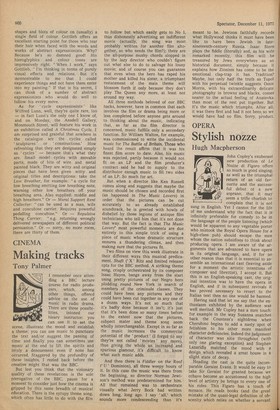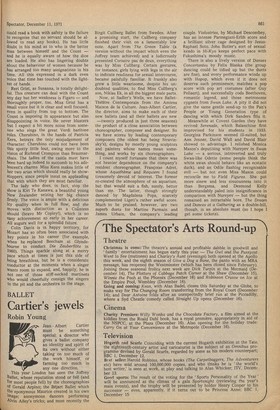OPERA
Stylish nozze
Hugh Macpherson
John Copley's exuberant new production of Le Nozze di Figaro offers so much in good singing, as well as the triumphal return of an old favourite and the successful debut of a new soprano, that it may seem a trifle churlish to complain that it is not sung in English. Yet I cannot for the life of me understand why the fact that it is infinitely preferable for comedy to be in the language of the people listening (which would be apparent to any vegetable porter who mistook the Royal Opera House for a high-class pub) should escape the men whom the nation subsidises to think about producing opera. I am aware of the arguments that are advanced to have opera in its original language, and, if for no other reason than that it is essential to assemble an international cast (leaving aside for a moment the artistic intentions of composer and librettist), I accept it. But this is an English-speaking cast, the original intention was to have the opera in English, and if in subsequent revivals it has proved necessary to revert to the Italian text then no One would be harmed.
Having said that let me say that the enthusiasm exhibited by the audience was well merited. Mr Copley has a sure touch: for example in the way Susanna snatches back the Countess's nightdress when Cherubino begins to add a nasty spot of fetishism to his other more manifest character deficiencies. Indeed the judgement of character was nice throughout (with only one glaring exception) and Stephen Lazaridis matched the mood with a design which revealed a great house in a slight state of decay.
Heading the cast is the quite incomparable Geraint Evans. It would be easy to take Sir Geraint for granted because we cchave become so accustomed to the high level of artistry he brings to every one of his roles. This Figaro has a touch of menace. He reads books (and the great mistake of the quasi-legal definition of obscenity which relies on whether a servant could read a book with safety is the failure to recognise that no servant should be allowed to read any books). He has little doubt in his mind as to who is the better man between himself and the Count — and he is equally aware of how the dice are loaded. He also has lingering doubts about the behaviour of women because he has arranged too many assignations in his time. All this expressed in a dark even voice that time has touched with the lightest of hands.
Reri Grist, as Susanna, is totally delightful. This creature can deal with the Count any day but her weakness is Figaro — and thoroughly proper, too. Miss Grist has a small voice but it is clear and well focused. even in quality from top to bottom. The Count is imposing in appearance but alas disappointing in voice. He never blusters but I expect a bit more noise from someone who sings the great Verdi baritone roles. Cherubino, in the hands of Patricia Kern, betrays the only misjudgement of character: Cherubino could not have been this spotty little lout, owing more to the vision of Richmal Crompton than Beaumarchais. The ladies of the castle must have been hard up indeed to succomb to his adolescent's charms. Miss Kern makes little of her two arias which should really be showstoppers, since people insist on applauding that with which they are most familiar.
The lady who does, in fact, stop the show is Kin i Te Kanawa, a beautiful young New Zealander seizing her big chance firmly. The voice is ample with a delicious Icy quality when in full flow, and she moves with distinction as a CoUntess Should (bravo Mr Copley!), which is no easy achievement so early in her career. All augurs well for a splendid future.
Colin Davis is in happy territory, for Mozart has so often been associated with key points in his career (for example, When he replaced Beecham at Glyndebourne to conduct Die Zauberflote in 1960). Things sparkle along at a merry Pace which at times is just this side of being breathless, but he is a considerate conductor at the moments when a singer Wants room to expand, and, happily, he is not one of those stiff-necked martinets Who would cheerfully consign the singers to the pit and the orchestra to the stage.











































 Previous page
Previous page